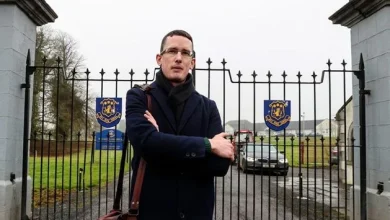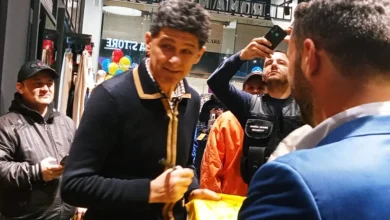Life is short. Here’s how to decide what’s worth your time

MANOUSH ZOMORODI, HOST:
It’s the TED Radio Hour from NPR. I’m Manoush Zomorodi. Today on the show – How We Shape Our Days. Many of us start off our day with a plan, a plan to get through our email, our home repair tasks or that ever-growing to-do list. And then just as often, we fail. And we think, you know, I didn’t get anything done. I must be doing this all wrong. There must be a better way.
OLIVER BURKEMAN: Yeah. I was on some level looking for the silver bullet because I actually was quite interested in learning how to be less anxious and not feel so completely out of control and overwhelmed.
ZOMORODI: This is author Oliver Burkeman. Back in his 20s, an anxious and ambitious Oliver was a young journalist trying to meet his nonstop deadlines.
BURKEMAN: I was locked into this mindset where it was always after the next deadline that I was going to finally figure out what I was doing and finally stop just subsisting on pizza and soda and finally stop ignoring my social life. And I was thinking that there was going to be one system or philosophy or book or technique or gadget that was going to finally deliver me the sense of being on top of things and in control. And all I had to do was follow that set of rules and life would be smooth sailing from then on.
ZOMORODI: Oliver tried method after method, from inbox zero to design thinking. And he wrote up his wry critiques of all these methodologies in a weekly dispatch for The Guardian called “This Column Will Change Your Life.” The name was tongue in cheek. And as the years went by, he came to an existential conclusion.
BURKEMAN: If you look around for that for many years and you write about it and you read and test things out and you never find it, I think you begin to think, maybe the question I’m asking is somehow the wrong question here.
ZOMORODI: Instead of asking how to optimize every day, he decided to ask, why bother? The answer was profound.
BURKEMAN: Our lives are short, specifically, they’re finite, right? And that finitude, that basic limitation, really courses through, you know, all our lives and everything that we do in our lives, but we spend a lot of time and a lot of effort trying to avoid it, trying not to think about it, trying to feel less limited than we are. And I think a lot of the kind of, quote-unquote, “bad” self-help and productivity advice is ultimately helping in psychological avoidance rather than the job it should be doing, which is bringing the most richness and depth and meaning to the time that we do have.
ZOMORODI: Confronting his own mortality and giving up on productivity, ironically, launched Oliver’s career as a self-help writer. His first book, “The Antidote,” came out in 2012. It critiqued positive thinking and encouraged people to, well, feel badly.
BURKEMAN: Perhaps one way of putting it is that it’s good to experience failure and goallessness and unhappiness and all these things. But I guess more so that a lot of what goes on in classic positive thinking is really to do with shutting out at least half of the human experience and sort of deeming it unacceptable.
ZOMORODI: He followed up in 2021 with the bestselling “Four Thousand Weeks,” the average time he estimated that each one of us gets on this planet. For those maybe who aren’t familiar, 4,000 weeks, and I don’t say this to be glib, but it is as though the Grim Reaper wrote a productivity book.
(LAUGHTER)
BURKEMAN: Yes. The sort of overarching thesis is that both acknowledging and even embracing our limited time and our limited control over how our time unfolds is actually a path to a much more fulfilling engagement with life. I was trying to synthesize all of that in the context of too many emails, endless to-do lists, feeling ever more impatient as the speed of society accelerates, but you’re still stuck in a traffic jam or can’t get a webpage to load, etc., etc., etc. So it was really a way of relating differently to our absolutely nonnegotiable limitations as humans.
ZOMORODI: So that brings us to your latest book, which is “Meditations For Mortals: Four Weeks To Embrace Your Limitations And Make Time For What Counts.” At first, I thought this was going to be, you know, literally a meditation, sit down, close…
BURKEMAN: Yeah.
ZOMORODI: …Your eyes sort of thing. But it’s not that. Tell us what the book’s about.
BURKEMAN: Yeah. For me, this book is much more about the sort of challenge of actually doing the things that you know you want to do with your finite time. On the planet, right? It’s sort of going from the knowing to the doing. And so I really wanted to try to write a book that you could sort of read, not wait to implement until your inbox is under control because when’s that going to happen? But sort of read right in the middle of all of that overwhelm and sort of subtly perhaps influence how you handle life right here and now instead of, you know, building up this whole perfectionistic notion of total transformation later, which is actually less effective anyway. So it’s actually not really transformation at all.
ZOMORODI: One of the things in particular that you talk about is this idea of having to make choices, that it feels like, you know, the world is your oyster, as the cliche goes. But actually, sometimes you need to sit down and make some hard decisions and ask yourself some hard questions. Would you mind reading us the passage that starts on Page 47?
BURKEMAN: Yeah. Absolutely. (Reading) Looking at things this way, indeed, you might argue that making a decision is the defining act of the limit-embracing life. As we’ve already seen, the fact that your time is limited, plus the reality that you can only ever be in one place at any instant, means that in every moment, you’re opting not to take a thousand alternative paths through life. From each of these paths branch another thousand alternatives and so endlessly on, like a vast river delta through which you could only follow any one of an immense variety of streams, but only one.
(Reading) That’s why indecision can feel so oddly comfortable. It’s a form of postponement, a temporary avoidance of the painful sacrifices involved. But differently, it’s a way of trying to dodge the inevitability of the consequences of your actions. To make a decision, any decision, is to take ownership of the situation instead. It takes a little willpower, but the reward is usually an immediate boost of motivation as you withdraw your psychological energies from denial or avoidance and focus them on action. Momentum starts to gather, and each decision proves easier to take than the last.
ZOMORODI: I love that because I am a person who wants it all.
BURKEMAN: (Laughter).
ZOMORODI: I’m incredibly greedy. I want everything in life, and that voraciousness is impossible. It’s impossible. And I know you hear a lot from readers about how your thinking and your ideas affect them and how they implement them. What are some of the things you hear about people when it comes to decision-making and deciding that productivity might look different than they thought it would?
BURKEMAN: I mean, one of the things I’m at pains to say in that chapter and elsewhere is that this kind of spirit of facing up to decision and being willing to understand that you’re always deciding anyway. So the question is, are you going to do it? You’re always going to – the only question is are you going to do it consciously…
ZOMORODI: (Laughter).
BURKEMAN: Or are you going to pretend that you’re not doing it? Like, I’m always at pains to emphasize it. I – for me, this is very much a kind of moment-to-moment kind of thing. It’s about little decisions. It’s about navigating through life in the spirit, not necessarily ever making, you know, grand gesture-type decisions, but really about sort of the general bearing. Now, I guess that, you know, I do hear from people who’ve found that to be useful just on that da-to-day level, but I think you – some sort of selection bias means that I’m more likely to hear from people who’ve kind of made big life changes – as they put it – as a result of reading my book now, maybe this is self-protective. But I have a theory that it isn’t really just like I came along and changed everything for them. I think that I’m really fascinated, actually, by this idea of permission. It seems like all of us, definitely me included, are constantly sort of looking for permission from some other source…
ZOMORODI: Yes, yes.
BURKEMAN: …In order to sort of acknowledge what you already know, right?
ZOMORODI: Yeah, yeah.
BURKEMAN: So when I hear from people, and I do hear from people who have left, usually certain career paths, but, you know, marriages in one time or another (laughter), and other – made other big changes or committed to new paths or gone back to university or something like this. I am pretty confident this was a choice that they were very nearly ready to make. This was something that had been sort of happening underneath the radar of consciousness. And I think what I – where I step in there sometimes, or where my writing steps in there, is it kind of takes away one option, which was – or one seeming option, which was that there might be a way of kind of just completely avoiding making a decision. I think when you see that you’re always choosing anyway, it’s very relaxing, ultimately. It’s stressful at first, but then it’s like, oh, OK, well, there isn’t a version of this rest of my life that involves not sacrificing. So the question is, which sacrifice am I prepared to make?
ZOMORODI: I mean, there’s a risk, right? Like, there’s a risk inherent in that you may not find a relationship that is better. You may have regrets. What do you tell people about that?
BURKEMAN: Well, I think that that sort of points to the deepest part of this for me, which is that – although it is obviously very important whether you have a happy relationship and a successful career and all of these things – it’s sort of ultimately most important that you lived with sort of openness to that possibility that you took the plunge, that you bet on yourself instead of against yourself, and that you sort of stepped into life in its most intense kind of engagement. And that, ultimately, you would rather have taken that risk and had it not work out than not to have taken the risk at all.
ZOMORODI: This is reminding me of my own experience with one of my kids who had to decide which college to go to. And he kept being like, well, how do I know if it’s the right decision? And I was like, guess what? No decision is ever right. It’s just that.
BURKEMAN: Right.
ZOMORODI: It’s a decision. And it’s up to you to make it, and then move forward and try to make it positive. You know, we sat down, we wrote the pros and cons of each of these places. And then I asked him – I was like, let’s look at each of your options and think of what it could be. Let’s envision it if it goes right, which one is most appealing then?
BURKEMAN: Yeah.
ZOMORODI: And I think – good job, Mom. I’d like to think that it helped.
BURKEMAN: (Laughter) It sounds like you’re a brilliant mom.
ZOMORODI: It was hard for me. I was like, God. I was like, is this right? I don’t know.
BURKEMAN: Right, right.
ZOMORODI: Again, parenting also not right (laughter).
BURKEMAN: Yeah, parenting is a whole – this is a whole domain for all these ideas and…
ZOMORODI: Oh, gosh.
BURKEMAN: …Dilemmas, absolutely. I think we’re sort of in the terrain here of sort of existentialist philosophy, right? I’m not an expert, but I think it’s this idea that actually another version of what you said to your kid, I think, could have been the – kind of what makes it the right decision is the spirit in which it’s taken, which is, yeah, that the full responsibility is taken for it, that – or as much as one can, that you do it in awareness of what you’re giving up. And I would add, yes, I think you’re absolutely right. Like, you do it on the basis of the best, like, reasonably likely case scenario. You don’t just do it on the basis of pure sort of defensiveness against the worst case. So that’s been a big thing for me, actually, personally. You know, this idea that what ultimately matters is that I’m living in a certain way or engaging with life in a certain way. And that does matter ultimately more than any individual result that comes from that, although that can be very, very hard wisdom to stomach at many points in life.
ZOMORODI: Well, particularly now, when to be a successful author – which you are – requires not just writing books that people like. It’s much more than that. It’s having a presence. It’s creating, quote-unquote, “content.” It’s audience engagement. There’s so many slightly nauseating terms…
BURKEMAN: (Laughter).
ZOMORODI: …That we can throw around about how you, you know, frankly, make a living as someone who writes about ideas. How are – how do you do that?
BURKEMAN: Yeah, I mean, stumblingly and imperfectly. And, like, I think I have a better appreciation than I did about the fact that, like, if there were a hundred hours in each day and you had a team of a hundred, you could find work to be done, right? So the more I feel my way into that, the easier it gets to just sort of be more true to what I’m interested in doing and, you know, write and post things that I feel have life in them for me. And what you find, what I’ve found again and again, is that, like, actually, that’s – that works better anyway.
I think people are really hungry for, like, the human and the real and the alive. And I think what that points to for anyone who’s involved in this kind of business is actually towards kind of embracing your idiosyncrasies and doing the things that you feel excited to do and not doing the things you feel less excited to do and less focus on the kind of very strategically designed personal brand or picking one niche and then relentlessly staying in it for fear of diluting your message.
ZOMORODI: I’m curious, what is giving you hope right now about how people are rethinking time and where they put their energy? Because, you know, I’m also just watching people are saying, oh, this is the end of social media, as they sort of – that there is a sense of disillusionment, but also a sense that you can’t exist without it. Tell me what you’re hearing.
BURKEMAN: Yeah, it’s really interesting. I think what gives me hope is that there is a kind of a seeing through the kind of greatest, most wild promises of this kind of technological change, right? There is a healthy awareness that convenience has come with all these costs. I do think, you know, I was so lucky to sort of be coming of age when personal computer technology was at the stage that it was – full of promise, but still fundamentally kind of, you know, a machine in the – in one room that you went to use for a while and then stopped.
But I feel like there’s a new tone. Like, even just a while – like, a few years ago, people spoke about, like, digital detox, for example, in this spirit of kind of where you’ve just got to try to defend against total distraction and misery. And now I do feel that people are understanding more that this is about stepping more fully into life – right? – that any – even just to be able to have that feeling that there isn’t enough kind of human reality in your day because of the situation that you live in technologically, economically or – even that represents a knowing about what’s important, and I think that is hopeful.
ZOMORODI: When we come back more with Oliver Burkeman and how he’s thinking about the AI siren call to more efficiency. On the show today – How We Shape Our Days. I’m Manoush Zomorodi, and you’re listening to the TED Radio Hour from NPR. We’ll be right back.
(SOUNDBITE OF MUSIC)
ZOMORODI: It’s the TED Radio Hour from NPR. I’m Manoush Zomorodi. Today on the show – How We Shape Our Days. We were just talking to Oliver Burkeman, whose latest book is called “Meditations For Mortals: Four Weeks To Embrace Your Limitations And Make Time For What Counts.” It’s daily thought exercises about mortality and what humans can accomplish – something that AI is promising they can overcome.
BURKEMAN: There’s something important about the kind of – the effect of generative AI on certainly any industries that involves sort of, you know, writing about things and talking about things that is – there’s something about those large language models that is – exerts a pressure towards the generic in quite a subtle way. Like, I’m not making the argument that the only thing that ChatGPT does is to regurgitate plagiarized sentences. I think there’s an argument there too, but that’s a sort of simple version of this. There’s something about the whole way that those things work to the extent that I understand how they work that is sort of exerting a force towards sameness, and that you can, I believe, I hope, I think, make a living setting yourself against that rather than just joining the race to the most generic place.
ZOMORODI: So I’m having a very strange experience with it. I’m actually really enjoying it and it’s kind of messing with my head, in that I think it might be able to make me more efficient, Oliver, and yet I worry that it’s tricking me into thinking that.
BURKEMAN: Yeah. I have to say, at this point, I do find that I really don’t want to be using generative AI for any but a very sort of specific delineated set of tasks. So I think there is this phenomenon where convenience. Things that strike us as very convenient have this repeating tendency to involve getting rid of not just the effort that we wanted to save, but also the very kinds of friction and engagements that made the thing worth doing in the first place. So I think that’s an important distinction. I feel like I can sort of imagine and start to put different AI use cases into those two buckets. Like, well, in this case, I’m just completely happy not to have that task in my life anymore.
But in the other case, like, there could be quite a lot going on that I don’t realize I will miss when I’m – when it’s not happening inside my own conscious mind. For a long time, there was this debate going on, which on one side had people claiming that, you know, an LLM would never be able to write a novel as – to as high a standard as a great human novelist, and on the other side, kind of, you know, AI boosters saying, like, that’s ridiculous. And I found myself realizing the really important thing for me in reading a novel written by a human is not that only a human could have written it. It’s the fact that a human did write it, and it’s the fact that I’m in some kind of relationship with a conscious, emoting sensibility. That’s what matters the most. And I’m always a bit flummoxed when AI people talk as if sentience, so this consciousness is kind of beside the point, somehow, ’cause it’s the thing that gives meaning to everything we do.
ZOMORODI: So you’re helping me articulate. Not to be devil’s advocate, but…
BURKEMAN: (Laughter).
ZOMORODI: …One of the things I’m starting to think about is not that it’s sentient, but that it’s collective, that actually, when I’m talking to an LLM, that it’s – you know, the only thing it’s basing its responses on is what humans have put in to begin with. And…
BURKEMAN: Yeah.
ZOMORODI: …So it’s taking the essence of humanity. That’s not to say the best of humanity.
BURKEMAN: (Laughter).
ZOMORODI: But there is something – it’s pulling, like, the most intense flavors of humanity in some ways, and giving them to me. And that’s for better or worse, like, I find that really interesting that it’s almost like I’m not talking to a machine, but I’m talking to everyone. Does that make any sense?
BURKEMAN: I can – it does make sense, and I can see it. But I guess, to me, it’s kind of an averaging out in a way that I think is different than what you might mean by something collective. Like, if a hundred people gather in a room and have a really interesting, well-structured sequence of conversations and debates, that’s one thing. And on the other hand, there is that sense of just sort of averaging out. You know, it’s like they…
ZOMORODI: Yes.
BURKEMAN: …You see things in magazines or whatever, where they’ve sort of taken the average of 200 faces.
ZOMORODI: Yes.
BURKEMAN: And it’s – the imaginary person who results from that is always kind of basically good-looking because that’s…
ZOMORODI: Yes.
BURKEMAN: …How looks and attractiveness and averages work, but also kind of, like, there’s something missing.
ZOMORODI: Yes.
BURKEMAN: Right? It’s like no unique identifying characteristics.
ZOMORODI: Yes, that spark, the weirdness.
BURKEMAN: Yeah, totally.
ZOMORODI: I want to circle back to a lot of these ideas. As I read your “Meditations For Mortals,” I have to – not that I’ve figured it out, but some of these ideas, I definitely felt like, oh, that used to bother me when I was younger. How much are some of these questions about just being a young person in the world and trying to figure out how to live a life?
BURKEMAN: I think that’s a really good point. Like, do you just have to live for some years in order to come into these insights? Is it something that just comes primarily through sort of a massing experience of being alive with all its failures and frustrations and difficulties? I am much less anxious than I was and much less obsessed with trying to find a way to do absolutely everything and much less anguished by sort of people-pleasing tendencies, but 100%, those things come back in a new form, in a deeper form. So it doesn’t stop. And I really like a lot of writing in the Zen Buddhist tradition, which focuses on this notion of saying that the problem that we encounter is thinking that there must be a solution to our situation.
So one of the quotes I use in the epigraph at the beginning of “Four Thousand Weeks” is from the American Zen teacher Charlotte Joko Beck, who says, “what makes it unbearable is your mistaken belief that it can be cured.” And I really love the bracing cold blast of air that is, for me, encapsulated in that. It’s, like, the problem is not that you haven’t figured everything out, got on top of everything, reached a position of perfect control. The only problem is thinking that it was ever on the cards for you to do that.
I want to make the case and I deeply want to believe that it’s precisely through this kind of acceptance that we are liberated to do the most that we could do and live the most sort of accomplished and interesting and difference-making lives that we can. So it’s not at all about sort of sighing and resigning yourself to the fact that you can’t do very much. It’s about seeing how vividly you can do a few things when you’re no longer chasing these mirages of not really being finite.
ZOMORODI: That was writer Oliver Burkeman. His latest book is called “Meditations For Mortals: Four Weeks To Embrace Your Limitations And Make Time For What Counts.” You can see his talks at ted.com.
Copyright © 2025 NPR. All rights reserved. Visit our website terms of use and permissions pages at www.npr.org for further information.
Accuracy and availability of NPR transcripts may vary. Transcript text may be revised to correct errors or match updates to audio. Audio on npr.org may be edited after its original broadcast or publication. The authoritative record of NPR’s programming is the audio record.





